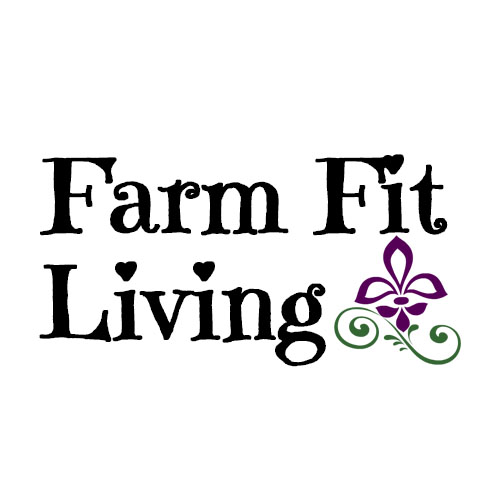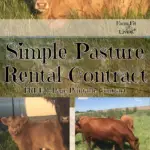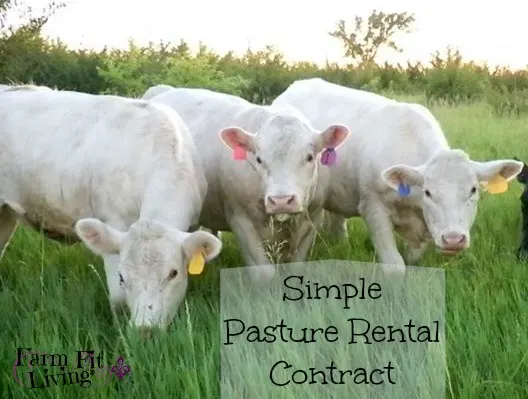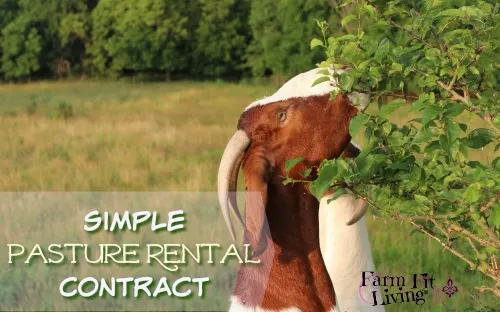If you have the opportunity to rent some pasture for your livestock, you shouldn’t agree to anything without a simple pasture rental contract.
Simple is the key here to this simple pasture rental contract. The contract does not have to be 600 pages long, but it does need to include all parameters for inputs and expenses.
Because you’ll never know when the landlord will “forget” that he had agreed to pay for fencing. This leaves you stuck with expenses you weren’t expecting.
In this post, I’ll explain more about why you need a contract when you rent pastures. You’ll find out what’s needed in that contract and why all of these pieces are important.
I’ll even explain some of the problems that might go wrong when during the negotiation process. Sound good to you? Let’s dive in!
Listen to the podcast episode:
This post contains Affiliate Links. This means if you click and buy, I might make a commission at no cost to you.
See my policy for more information
Why Should You Rent Pasture?
Cattle, sheep, and other grazing animals need to be on pasture when the grass quality is prime. You have to be sure you have access to good quality pasture land to have healthy livestock.
Additionally, if you want to grow your livestock numbers, you’ll need more land. To acquire more land, you have two choices: Buy or rent. There is no such thing as free grazing land. There is ALWAYS a cost.
Renting pasture is a great way to grow your livestock venture. It requires an agreement by two parties. The landlord is the owner of the land and the tenant is the person renting the pasture.
Here are some frequently asked questions about pasture leases:
- How much should I rent my pasture for?
- Where can I find a short pasture lease agreement?
- Pasture rent for cow-calf pairs?
- How do I start the conversation of a simple pasture land lease agreement?
Let’s get into that first. How to start the talk of negotiation.
How to start negotiation of the simple pasture rental contract
Usually, the landlord approaches the tenant to rent the pasture. But sometimes, it’s the other way around.
The tenant may ask the landlord to rent their pasture.
While word of mouth agreements are nice and fuzzy, it’s really just the first step anymore to negotiating terms for rent.
To keep all terms fair and stern, it’s important to acquire a signed contract.
Here’s a very simple template in PDF form for the simple pasture rental contract.
The parts of the contract.
First things first: This is a pasture rental agreement for cattle we’ve been using for years. However, this simple pasture lease agreement form I’m sharing with you today can be used for agreements for other grazing animals as well.
Here is the first part of the contract you’ll need to have available:
– Name and contact information of the landlord – This should be the full name and address of the landlord.
– Name and address of the tenant – Self explanatory.
Land Description
The size and layout of the ground. Number of acres is important to know for the payment formula.
Time period of Contract:
Start date to end date. At which time the contract will be renegotiated.
Pasture fence material share:
Landlord 100%, Tenant 0% or other terms negotiated and agreed upon by both parties.
Pasture Fence Labor Share:
Landlord 0%, Tenant 100% or other terms negotiated and agreed upon by both parties.
Cost Share for Inputs:
– Fertilizer: Tenant: 100%
– Herbicides: Tenant: 100%
– Grass Seed: Tenant: 100%
These are only examples of common inputs and may include more based on the layout and needs of the land. It’s very important to include all of the inputs through the grazing season.
Annual Grazing Period:
The amount of time the livestock will be on the land. For example: May 1st – November 1st Annually.
Payment Terms:
Annual rent is designated by the yearly county average pasture rate per acre. You’ll also use the number of acres on the land to come up with the rate. Annual rent payments are negotiable but usually settled at the beginning of the contract date. In most agreements, the tenant pays the landlord the entire rental fee up front. Another option would be for the tenant to pay half the rent up front and the other half through the grazing season as agreed upon by the contract.
The Payment Formula:
The total annual rent is ([Pasture Rental Rate] x [Number of Total Acres to be Grazed]) = Total Pasture Rent.
Signatures:
This part is the most important part of the contract process.
Both parties MUST sign and date the contract.
Why is a simple pasture rental contract so important?
Imagine this. You and a landlord have agreed to spoken terms to rent the landlord’s pasture.
Three months into the grazing season, the landlord decides he/she wants your livestock off the place because he wants to buy cattle for the pasture.
What would you do with your own cattle if this happened? Would you be forced to sell? All your hard work and goals down the drain?
Or, what if the landlord decided he/she would not pay for the fencing as issued in the contract?
Because he/she “forgot” the terms of what was agreed upon by spoken word.
A written simple pasture rental contract proves what was said, agreed upon, and signed by both parties. It prevents hard feelings and broken terms through the life of the contract.
Other Considerations:
Type of livestock to be grazed on the land should be negotiated. The stocking rate should be determined based on the type of vegetation and terrain of the land.
For information on pasture rental and species stocking rate, you can contact your local county Extension agricultural agent. All prices and rates are different county by county, so it’s best to know your own area before jumping into pricing.
Problems you may face:
Other family members or neighbors may not be ok with you renting this particular piece of ground. It’s simply important to verify your intentions with all parties and to keep all negotiations fair.
It may be necessary to include an attorney and to have the contract inspected in case of any upcoming situations that may arrise with outside parties who may be problematic.
An attorney also may be a wise choice in case any terms of the contract are broken by either party.
Simple farm pasture leases do not have to be problematic at all as long as both parties are fair. Good communication along with a written and signed contract will help make all terms peaceful and concrete.





